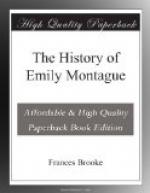Believe me, my dear Madam,
Your
affectionate
Emily
Montague.
LETTER 119.
To Mrs. Temple, Pall Mall.
Silleri, April 9.
Your brother, my dear, is gone to Montreal to look out for a settlement, and Emily to spend a fortnight at Quebec, with a lady she knew in England, who is lately arrived from thence by New York.
I am lost without my friend, though my lover endeavors in some degree to supply her place; he lays close siege; I know not how long I shall be able to hold out: this fine weather is exceedingly in his favor; the winter freezes up all the avenues to the heart; but this sprightly April sun thaws them again amazingly. I was the cruellest creature breathing whilst the chilly season lasted, but can answer for nothing now the sprightly May is approaching.
I can see papa is vastly in Fitzgerald’s interest; but he knows our sex well enough to keep this to himself.
I shall, however, for decency’s sake, ask his opinion on the affair as soon as I have taken my resolution; which is the very time at which all the world ask advice of their friends.
A letter from Emily, which I must answer: she is extremely absurd, which your tender lovers always are.
Adieu! yours,
A.
Fermor.
Sir George Clayton had left Montreal some days before your brother arrived there; I was pleased to hear it, because, with all your brother’s good sense, and concern for Emily’s honor, and Sir George’s natural coldness of temper, a quarrel between them would have been rather difficult to have been avoided.
LETTER 120.
To Miss Fermor.
Quebec, Thursday morning.
Do you think, my dear, that Madame Des Roches has heard from Rivers? I wish you would ask her this afternoon at the governor’s: I am anxious to know, but ashamed to enquire.
Not, my dear, that I have the weakness to be jealous; but I shall think his letter to me a higher compliment, if I know he writes to nobody else. I extremely approve his friendship for Madame Des Roches; she is very amiable, and certainly deserves it: but you know, Bell, it would be cruel to encourage an affection, which she must conquer, or be unhappy: if she did not love him, there would be nothing wrong in his writing to her; but, as she does, it would be doing her the greatest injury possible: ’tis as much on her account as my own I am thus anxious.
Did you ever read so tender, yet so lively a letter as Rivers’s to me? he is alike in all: there is in his letters, as in his conversation,
“All that can softly win, or gaily
charm
The heart of woman.”
Even strangers listen to him with an involuntary attention, and hear him with a pleasure for which they scarce know how to account.




